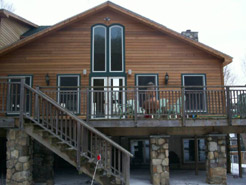Home
The word home has many meanings of which the most common is; the house or place in which one lives or dwells either by themselves or with a companion or family.
Another definition for home is the place where one was born, their native land or of their ancestors, country or place where one dwells.

A home can be a place of rest and refuge; the grave; an asylum; as home for outcasts or the blind; dwelling place for the soul, are some more definitions of home.
Simply stated a place of comfort, residence or refuge is home.
The modern home or household of today has means of preparing food and sanitary facilities and is a place where one can store personal property.
Home may also relate to an emotional or mental state of mind and not be associated with a physical location.
In our residential community institutions of today there are several types of homes such as, group homes, nursing homes, retirement homes, orphanages, foster homes, and prisons.
The environment of a person's home has a physiological influence on their emotions, behavior, and general mental health because we are mainly creatures of habit.
Some people after leaving home over a period of time experience what is known as homesickness or a longing for home which can cause actual feelings or symptoms of an illness.
The greatest sense of home psychologically almost always coincides geographically with a residence or dwelling.

Self-reflection such as who one might become, used to be, or who one is, can be triggered by the physical places called home.
Places that we share of collective identity from history such as Ground Zero or Gettysburg can cause these types of reflection.
The daily roles and responsibilities of the household has shifted somewhat over recent years and today these activities are more commonly shared between the mother and father than had previously been done because of the need for both partners to earn an income outside of the home.
Home Topics:
Main Topics: